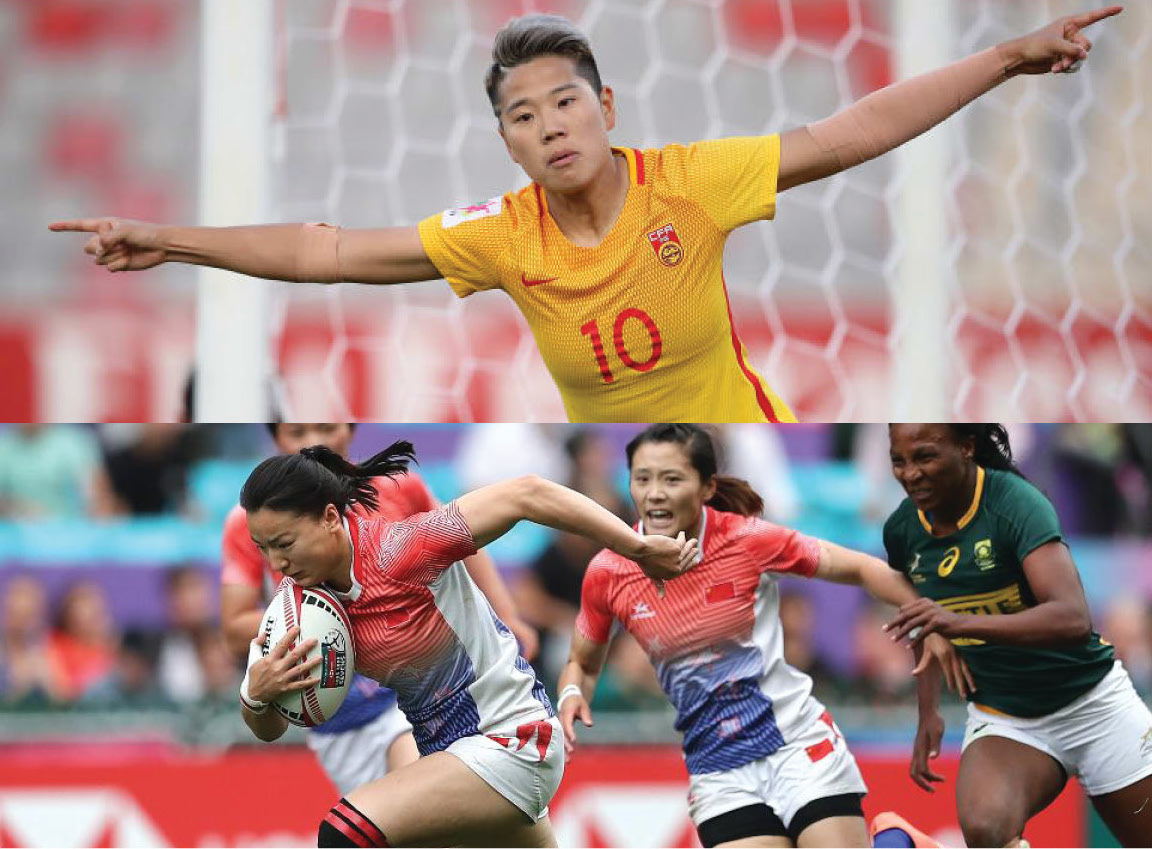When it comes to sports success in China, it’s all about the women

The China Sports Column is a The China Project weekly feature in which China Sports Insider Mark Dreyer looks at the week that was in the China sports world.
The oft-used phrase in China about women holding up half the sky might seem like empty rhetoric if you look at certain sectors — high politics, for instance — but sports is one area where women are not only fulfilling their half of the bargain, but outperforming men by a distance.
Wu Dajing’s 武大靖 gold medal at the Pyeongchang Olympics this year was the only gold won by China this time around. But it was also just the second Winter Olympics gold medal won by a man, versus 10 won by women (plus another in pairs figure skating).
Tennis star Li Na 李娜 won two Grand Slam tournaments in her career and peaked at No. 2 in the world. Meanwhile, we’re still waiting for a Chinese male to break into the Top 100, let alone win a major tournament.
Over in golf, it’s the same story. Rising male star Li Haotong 李昊桐 just finished level with Tiger Woods on his Masters debut last week, and is now ranked 42nd in the world. But compare that with Feng Shanshan 冯珊珊, who is solidifying her position at the top of the women’s world rankings, and boasts the 2012 LPGA Championship among her 22 professional wins.
Tennis and golf are individual examples, but historically China’s women have also performed better at team sports — and that’s been the case this week, too.
While the men’s national soccer team just slipped eight places in the latest FIFA rankings, the women’s team has become the first side outside of hosts France — who qualify automatically — to earn a spot at next year’s Women’s World Cup finals. 4-0 and 3-0 wins over Thailand and the Philippines in the AFC Women’s Asian Cup meant they were guaranteed to receive a World Cup berth even before an 8-1 thrashing of hosts Jordan on Thursday.
Bandages — the ones that cover tattoos, like the one seen on Li Ying’s 李影 arm in the picture above — apparently don’t affect the women quite as much as their male counterparts.
Tattoo ban latest humiliation for China’s beleaguered soccer team
Tougher competition now looms in the form of South Korea, Australia, or Japan in next week’s semifinal, but China currently has the top three goalscorers in the tournament and has done everything asked of it thus far.
Meanwhile, in the comparatively newer sport of rugby, China’s women’s sevens team won the famous Hong Kong Sevens event for the first time last weekend, with an impressive 31-14 victory over South Africa. It was one of seven straight victories registered in Hong Kong and sees China regain its place in the HSBC Women’s Sevens Series for 2019, the annual series of five elite tournaments around the world.
China's Wang Wan Yu scores a brilliant winning try at the Hong Kong qualifier to get her side into the #HSBC7s 2019 as a core team! pic.twitter.com/oxHxIEqsBZ
— HSBC SVNS (@SVNSSeries) April 6, 2018
It wasn’t all good news for Chinese rugby in Hong Kong, however, as World Rugby chief Brett Gosper admitted that Alisports’ $100 million investment to develop the sport in China was “on hold” after slower-than-expected progress and confusion about who exactly was calling the shots at the top level in China, with Alisports, the Chinese Rugby Football Association, China’s sports ministry, and World Rugby all involved to a greater or lesser extent.
Gosper was also quoted as claiming that China has 30 million rugby fans — equal to the U.S. as the most in any country in the world — though his explanation that this number was reached through “research and so on” did little to improve the credibility of that statistic.
UPDATE: It’s actually 33 million, according to Gosper:
https://twitter.com/brettgosper/status/984783269622403072
As an aside, it’s toss-up between which is more unpalatable — Gosper’s 30 million claim or the design of the Chinese women’s rugby shirts. It’s unclear who exactly sanctioned these monstrosities — which have little bearing on China’s well established color scheme of red, white, and yellow — but a look at Zinedine Zidane’s French World Cup team from 1998 perhaps gives a clue as to their origin.
One sport in which China most definitely is not at the top — either for men or women — is motorsports, a fact that will be in evidence at this weekend’s Chinese F1 Grand Prix in Shanghai. However, two-time F1 world champion Fernando Alonso is trying to change all that, having announced that his official karting school plans to build 40 go-kart tracks around China over the next five years.
It’s undoubtedly good news for the sport — which is associated, sometimes unfairly, with the image of the sons of corrupt officials drag racing around Chinese streets — but we are still a very long way from seeing a Chinese driver behind the wheel during an F1 race. That’s not to say there’s no Chinese presence on the grid, however, after two recent deals gave Chinese firms increased visibility in F1. Alibaba’s Tmall logo can now be seen on the Renault F1 cars, while Lenovo will be looking for Sebastian Vettel to complete a hat trick of wins in Shanghai after the Chinese laptop manufacturer signed with Ferrari at just the right time.
Elsewhere, baseball in China received a boost this month as MLB signed a wide-ranging content deal with Tencent, which is now home to all four major U.S. sports leagues in China. Tencent will stream 125 games per season, including the All-Star game and the entire postseason. MLB has a number of training centers in China that have so far produced three Chinese players who have signed pro contracts in the U.S. While none of them look like transforming into Japanese sensation Shohei Ohtani any time soon, it is this correspondent’s assertion that MLB has a better chance of seeing more Chinese players in the majors over the next decade than any of the NBA, NFL, or NHL.
The China Sports Column runs every Friday on The China Project. Follow Mark Dreyer @DreyerChina.





